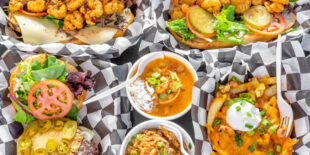The choice was painful, but clear: The Mango Breeze had to go.
Phillip Ingram, owner of Lonni’s Sandwiches in St. Petersburg, Florida, had seen costs soar on two of the popular, vegetarian sandwich’s key, imported ingredients. Brie had shot up more than 40%; mango chutney more than doubled in cost. “I would have had to raise the sandwich price 30% just to maintain margin,” he says Ingram, a Clover customer. “So I took it off the menu.”
But Ingram didn’t just subtract; he added a new, vegetarian sandwich that was both tasty and cost-efficient. The Big Red comes on a spinach wrap, with hummus, pesto, red pepper, sprouts and red onions. And it sells for $8.49 compared to $9.89 for the Mango Breeze. “With any new sandwich, it takes a little while for it to pick up,” Ingram says. “But the Big Red is part of our normal mix of sellers now, and people seem pretty receptive.”
Restaurant owners and other entrepreneurs could be forgiven for thinking they can’t catch a break these days. Just as COVID restrictions have let up in many parts of the country and indoor dining has returned, small business owners now face the two-headed dragon of soaring costs driven by inflation and supply chain breakdowns.
The stress is showing up in growing pessimism among this typically indefatigable breed. According to the Small Business Optimism Index released by the National Federation of Independent Business, the percentage of business owners who think things will improve economically over the next six months has fallen to the lowest level in the 48-year history of the survey.
But Ingram’s story, and the experiences of other small business owners, show that there are creative ways to manage the current challenges:
Think ahead on inventory
With the global supply chain in flux, it’s more important than ever to stay on top of your inventory. Evan McCarthy, president of custom dental products company Sporting Smiles, stocked up on key supplies to buffer his business against soaring materials costs. “We reorganized our warehouse and now have pallets full of supplies reaching to the ceiling in the 10,000-square-foot space,” McCarthy told americanexpress.com.
Clover offers unique and best-in-class inventory managing systems that can update automatically with both in-person and online sales. With Clover staying on top of your back-room stock automatically, you can always be prepared to make a menu shift or let your customers know preemptively that you’ll be out of something.
Small changes bring big savings
Lonni’s Sandwiches offered more than 20 turkey-based bites on the menu when soaring turkey prices prompted owner Ingram to cull and curate his offerings, taking three turkey sandwiches off the menu while adding two, more economical ham-based delights: The Honey, I’m Ham (Ham, swiss cheese, pickles, tomatoes and Dijon mustard on Lonni’s signature potato bread, $8.59) and the Bar-b-cuban (ham, bacon, pesto, mayo, pickles and gold, Carolina-style barbecue sauce hot-pressed on Cuban bread. “The Bar-b-cuban is now a huge seller,” Ingram says.
“We did have to raise prices, but not as much as we would have, because we drilled down into our commodity prices and designed a smart menu.”
The art of the pivot
Amanda Nguyen, owner of San Francisco bakery, Butter &. made headlines for saving her business and sweetening COVID lockdown by expanding from big-occasion, buttercream cakes to sell small, affordable “quarantine cakes.” In recent months, soaring egg, butter, flour and sugar prices forced Nguyen to raise prices on her big-ticket cakes, but inflation kept outpacing her. So the creative entrepreneur pivoted again and opened a second business, Pastel, that delivers Butter& goods and other treats in the Bay area. “You can’t just sit still,” Nguyen told cnbc.com. “You have to change.”
Power in numbers
With supply costs soaring, buying in bulk is one effective way to control costs. That’s not always easy for a small business to do, so Ingram of Lonni’s sandwiches teamed up with two local ice cream shops to buy large volumes of paper goods and plasticware—napkins, utensils, catering trays—and splitting the costs.
“The biggest thing for anyone in this industry to remember is we’re all in this together,” Ingram says. “Don’t be afraid to reach out to people you might think of as competitors. They might be your greatest asset.”
Other posts you may like






